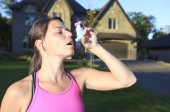Search Podcasts
What summer foods should you be adding to your grocery list?
Additional Info
- Segment Number 1
- Audio File train_your_body/1528tb2a.mp3
- Featured Speaker Felicia Stoler, PhD
- Organization American College of Sports Medicine
- Book Title Living Skinny in Fat Genes™: The Healthy Way to Lose Weight and Feel Great
- Guest Website Felicia Stoler
-
Guest Bio
 Dr. Felicia Stoler is a registered dietitian, exercise physiologist and expert consultant in disease prevention, wellness and healthful living. She has a bachelors from Tulane University, a masters in applied physiology and nutrition from Columbia University and her doctorate in clinical nutrition from UMDNJ.
Dr. Felicia Stoler is a registered dietitian, exercise physiologist and expert consultant in disease prevention, wellness and healthful living. She has a bachelors from Tulane University, a masters in applied physiology and nutrition from Columbia University and her doctorate in clinical nutrition from UMDNJ.
Felicia serves on many local, state and national committees related to health and wellness. She is a member of the American College of Sports Medicine and is a Fellow of the ACSM. Felicia is a member of the Academy of Nutrition and Dietetics and is on the House of Delegates.
Dr. Stoler hosted the second season of TLC's groundbreaking series, Honey, We're Killing the Kids!, which took aim at the unhealthy lifestyles of families across the country, in an effort to motivate them to make positive changes.
She is the author Living Skinny in Fat Genes™: The Healthy Way to Lose Weight and Feel Great (Pegasus) which was featured in USA Weekend among the top must-have books in 2011. She has been a contributor for FoxNews.com and written several book chapters. Stoler authored the ACSM's Current Comment on Childhood Obesity. - Length (mins) 10
- Waiver Received Yes
- Host Melanie Cole, MS
Are there any foods you should be avoiding during the summer months?
Additional Info
- Segment Number 2
- Audio File train_your_body/1528tb2b.mp3
- Featured Speaker Felicia Stoler, PhD
- Organization American College of Sports Medicine
- Book Title Living Skinny in Fat Genes™: The Healthy Way to Lose Weight and Feel Great
- Guest Website Felicia Stoler
-
Guest Bio
 Dr. Felicia Stoler is a registered dietitian, exercise physiologist and expert consultant in disease prevention, wellness and healthful living. She has a bachelors from Tulane University, a masters in applied physiology and nutrition from Columbia University and her doctorate in clinical nutrition from UMDNJ.
Dr. Felicia Stoler is a registered dietitian, exercise physiologist and expert consultant in disease prevention, wellness and healthful living. She has a bachelors from Tulane University, a masters in applied physiology and nutrition from Columbia University and her doctorate in clinical nutrition from UMDNJ.
Felicia serves on many local, state and national committees related to health and wellness. She is a member of the American College of Sports Medicine and is a Fellow of the ACSM. Felicia is a member of the Academy of Nutrition and Dietetics and is on the House of Delegates.
Dr. Stoler hosted the second season of TLC's groundbreaking series, Honey, We're Killing the Kids!, which took aim at the unhealthy lifestyles of families across the country, in an effort to motivate them to make positive changes.
She is the author Living Skinny in Fat Genes™: The Healthy Way to Lose Weight and Feel Great (Pegasus) which was featured in USA Weekend among the top must-have books in 2011. She has been a contributor for FoxNews.com and written several book chapters. Stoler authored the ACSM's Current Comment on Childhood Obesity. - Length (mins) 10
- Waiver Received Yes
- Host Melanie Cole, MS
Who can participate in the senior games?
Additional Info
- Segment Number 2
- Audio File train_your_body/1527tb2b.mp3
- Featured Speaker Pam Peeke, MD
- Organization American College of Sports Medicine
-
Guest Bio
 Dr. Pamela Peeke is an internationally renowned physician, scientist and expert in the fields of nutrition, metabolism, stress and fitness.
Dr. Pamela Peeke is an internationally renowned physician, scientist and expert in the fields of nutrition, metabolism, stress and fitness.
Calling herself an "edutainer," Dr. Peeke uses her trademark wit and wisdom to provide audiences with a healthy lifestyle message in such a memorable and entertaining style that she is one of the most requested physician speakers in America. An avid athlete, Dr. Peeke is nationally known as the "doc who walks the talk," as she inspires by living the message she teaches.
Dr. Peeke is featured in the National Institutes of Health's "Changing Face of Medicine" exhibit on the history of women physicians at the National Library of Medicine. She has been named one of America's top physicians by the Consumers Research Council of America. Dr. Peeke is a Pew Foundation Scholar in Nutrition and Metabolism, Assistant Professor of Medicine at the University of Maryland and Fellow of the American College of Physicians.
Dr. Peeke has teamed with the U.S. Surgeon General to create the Surgeon General Walks for a Healthy and Fit Nation. She is a member of the Maryland Governor's Council on Fitness, and is national spokesperson for the American College of Sports Medicine's Exercise is Medicine global campaign.
Dr Peeke is the lifestyle expert for WebMD's 90 million members, using a multimedia educational approach that includes The Everyday Fitness with Dr. Pam Peeke blogs, newsletters, podcasts and her healthy diet and lifestyle community exchange.
The Chief Medical Correspondent for Discovery Health TV, she is featured in the award winning National Body Challenge series, as well as her Could You Survive? miniseries. Her book, The National Body Challenge Success Program for the Whole Family, is the best selling companion guide to her television and web-based program which is presently followed by over a million American families.
Dr. Peeke is the New York Times bestselling author of Fight Fat after Forty, Body for Life for Women, Fit to Live and The Hunger Fix. Dr. Peeke is the recipient of the Audie Award for her narration and interpretation of Fit to Live. Her Could You Survive? pilot was a finalist for the International Health and Medical Media Freddie Award, considered the highest award for excellence in medical film production.
Dr. Peeke's newest book, The Hunger Fix: The 3-Stage Detox and Recovery Plan for Overeating and Food Addiction, launched September 21st on Katie Couric's new show, followed by Good Morning America, Nightline and a bicoastal book tour. Within five days of launch, The Hunger Fix became a New York Times bestseller. - Length (mins) 10
- Waiver Received Yes
- Host Melanie Cole, MS
Should your fitness age be younger than your real age?
Additional Info
- Segment Number 1
- Audio File train_your_body/1527tb2a.mp3
- Featured Speaker Pam Peeke, MD
- Organization American College of Sports Medicine
-
Guest Bio
 Dr. Pamela Peeke is an internationally renowned physician, scientist and expert in the fields of nutrition, metabolism, stress and fitness.
Dr. Pamela Peeke is an internationally renowned physician, scientist and expert in the fields of nutrition, metabolism, stress and fitness.
Calling herself an "edutainer," Dr. Peeke uses her trademark wit and wisdom to provide audiences with a healthy lifestyle message in such a memorable and entertaining style that she is one of the most requested physician speakers in America. An avid athlete, Dr. Peeke is nationally known as the "doc who walks the talk," as she inspires by living the message she teaches.
Dr. Peeke is featured in the National Institutes of Health's "Changing Face of Medicine" exhibit on the history of women physicians at the National Library of Medicine. She has been named one of America's top physicians by the Consumers Research Council of America. Dr. Peeke is a Pew Foundation Scholar in Nutrition and Metabolism, Assistant Professor of Medicine at the University of Maryland and Fellow of the American College of Physicians.
Dr. Peeke has teamed with the U.S. Surgeon General to create the Surgeon General Walks for a Healthy and Fit Nation. She is a member of the Maryland Governor's Council on Fitness, and is national spokesperson for the American College of Sports Medicine's Exercise is Medicine global campaign.
Dr Peeke is the lifestyle expert for WebMD's 90 million members, using a multimedia educational approach that includes The Everyday Fitness with Dr. Pam Peeke blogs, newsletters, podcasts and her healthy diet and lifestyle community exchange.
The Chief Medical Correspondent for Discovery Health TV, she is featured in the award winning National Body Challenge series, as well as her Could You Survive? miniseries. Her book, The National Body Challenge Success Program for the Whole Family, is the best selling companion guide to her television and web-based program which is presently followed by over a million American families.
Dr. Peeke is the New York Times bestselling author of Fight Fat after Forty, Body for Life for Women, Fit to Live and The Hunger Fix. Dr. Peeke is the recipient of the Audie Award for her narration and interpretation of Fit to Live. Her Could You Survive? pilot was a finalist for the International Health and Medical Media Freddie Award, considered the highest award for excellence in medical film production.
Dr. Peeke's newest book, The Hunger Fix: The 3-Stage Detox and Recovery Plan for Overeating and Food Addiction, launched September 21st on Katie Couric's new show, followed by Good Morning America, Nightline and a bicoastal book tour. Within five days of launch, The Hunger Fix became a New York Times bestseller. - Length (mins) 10
- Waiver Received Yes
- Host Melanie Cole, MS
Is exercise the key to better sleep?
Additional Info
- Segment Number 2
- Audio File health_radio/1526ml2b.mp3
- Featured Speaker John P. Higgins, MD
- Organization American College of Sports Medicine
-
Guest Bio
 John P. Higgins MD, MBA (Hons), MPHIL, FACC, FACP, FAHA, FACSM, FASNC, FSGC, is a sports cardiologist for The University of Texas Health Science Center at Houston, Memorial Hermann-Texas Medical Center and the Harris Health System. His research interests include the effects of energy beverages on the body, and screening for underlying cardiovascular abnormalities in 12-year-olds (6th graders), and steroid effects on the cardiovascular system.
John P. Higgins MD, MBA (Hons), MPHIL, FACC, FACP, FAHA, FACSM, FASNC, FSGC, is a sports cardiologist for The University of Texas Health Science Center at Houston, Memorial Hermann-Texas Medical Center and the Harris Health System. His research interests include the effects of energy beverages on the body, and screening for underlying cardiovascular abnormalities in 12-year-olds (6th graders), and steroid effects on the cardiovascular system.
- Length (mins) 10
- Waiver Received No
- Host Melanie Cole, MS
What types of exercises can improve your asthma symptoms?
Additional Info
- Segment Number 1
- Audio File health_radio/1526ml2a.mp3
- Featured Speaker John P. Higgins, MD
- Organization American College of Sports Medicine
-
Guest Bio
 John P. Higgins MD, MBA (Hons), MPHIL, FACC, FACP, FAHA, FACSM, FASNC, FSGC, is a sports cardiologist for The University of Texas Health Science Center at Houston, Memorial Hermann-Texas Medical Center and the Harris Health System. His research interests include the effects of energy beverages on the body, and screening for underlying cardiovascular abnormalities in 12-year-olds (6th graders), and steroid effects on the cardiovascular system.
John P. Higgins MD, MBA (Hons), MPHIL, FACC, FACP, FAHA, FACSM, FASNC, FSGC, is a sports cardiologist for The University of Texas Health Science Center at Houston, Memorial Hermann-Texas Medical Center and the Harris Health System. His research interests include the effects of energy beverages on the body, and screening for underlying cardiovascular abnormalities in 12-year-olds (6th graders), and steroid effects on the cardiovascular system.
- Length (mins) 10
- Waiver Received No
- Host Melanie Cole, MS
How can exercise prevent osteoporosis?
Additional Info
- Segment Number 2
- Audio File train_your_body/1525tb2b.mp3
- Featured Speaker Grace Desimone & Neal Pire, Fitness Experts
- Organization ACSM
-
Guest Bio
 Neal Pire is a nationally noted expert on fitness and personal training. He is a Fellow of the American College of Sports Medicine and has served on the Executive Council of ACSM's credentialing arm, the Committee on Certification and Registry Boards.
Neal Pire is a nationally noted expert on fitness and personal training. He is a Fellow of the American College of Sports Medicine and has served on the Executive Council of ACSM's credentialing arm, the Committee on Certification and Registry Boards.
Neal served as vice president of a leading national health management company and now serves as an Exercise Physiologist at HNH Fitness, a medical fitness center in Oradell, NJ. He is widely sought after as a consultant for athlete training programs, performance enhancement centers and fitness industry management.
As a 35-year veteran with deep understanding of the subject matter, he is often asked for background, commentary or analysis by media covering wellness, fitness, and personal training. Grace DeSimone has been in the fitness industry for over 30 years and brings a variety of experiences in commercial, corporate and community settings.
Grace DeSimone has been in the fitness industry for over 30 years and brings a variety of experiences in commercial, corporate and community settings.
She is the editor of ACSMs Resources for Group Exercise Instructors (LWW, 2011) and is an ACSM certified personal trainer and group exercise instructor. Grace is the National Director of Group Fitness for Plus One Health Management, an Optum Company. - Length (mins) 10
- Waiver Received No
- Host Melanie Cole, MS
What's professional gym etiquette when it comes to personal space?
Additional Info
- Segment Number 1
- Audio File train_your_body/1525tb2a.mp3
- Featured Speaker Grace Desimone & Neal Pire, Fitness Experts
- Organization ACSM
-
Guest Bio
 Neal Pire is a nationally noted expert on fitness and personal training. He is a Fellow of the American College of Sports Medicine and has served on the Executive Council of ACSM's credentialing arm, the Committee on Certification and Registry Boards.
Neal Pire is a nationally noted expert on fitness and personal training. He is a Fellow of the American College of Sports Medicine and has served on the Executive Council of ACSM's credentialing arm, the Committee on Certification and Registry Boards.
Neal served as vice president of a leading national health management company and now serves as an Exercise Physiologist at HNH Fitness, a medical fitness center in Oradell, NJ. He is widely sought after as a consultant for athlete training programs, performance enhancement centers and fitness industry management.
As a 35-year veteran with deep understanding of the subject matter, he is often asked for background, commentary or analysis by media covering wellness, fitness, and personal training. Grace DeSimone has been in the fitness industry for over 30 years and brings a variety of experiences in commercial, corporate and community settings.
Grace DeSimone has been in the fitness industry for over 30 years and brings a variety of experiences in commercial, corporate and community settings.
She is the editor of ACSMs Resources for Group Exercise Instructors (LWW, 2011) and is an ACSM certified personal trainer and group exercise instructor. Grace is the National Director of Group Fitness for Plus One Health Management, an Optum Company. - Length (mins) 10
- Waiver Received No
- Host Melanie Cole, MS
You may not realize it, but juice has just as much sugar as soda pop.
Additional Info
- Segment Number 2
- Audio File train_your_body/1523tb2b.mp3
- Featured Speaker Brian Parr, PhD
- Organization ACSM
-
Guest Bio
 Brian Parr, Ph.D., is an Associate Professor of Exercise and Sports Science at the University of South Carolina Aiken where he teaches undergraduate courses in exercise physiology, research methods, nutrition, and health behaviors. He also conducts research in physical activity and weight control. Dr. Parr is an ACSM member and an ACSM Certified Clinical Exercise Physiologist. Dr. Parr writes a weekly Health & Fitness column for a local newspaper and is a regular contributor to magazines, websites, and professional publications. You can learn more at http://drbrianparr.wordpress.com/ or on Twitter @drbrianparr.
Brian Parr, Ph.D., is an Associate Professor of Exercise and Sports Science at the University of South Carolina Aiken where he teaches undergraduate courses in exercise physiology, research methods, nutrition, and health behaviors. He also conducts research in physical activity and weight control. Dr. Parr is an ACSM member and an ACSM Certified Clinical Exercise Physiologist. Dr. Parr writes a weekly Health & Fitness column for a local newspaper and is a regular contributor to magazines, websites, and professional publications. You can learn more at http://drbrianparr.wordpress.com/ or on Twitter @drbrianparr.
-
Transcription
RadioMD Presents: Train Your Body | Original Air Date: June 2, 2015
Host: Melanie Cole, MS
Guest: Brian Parr, PhD
Your health, your wellness, your fitness, around the world, around the clock, around the block. This is RadioMD. This is Train Your Body with Melanie Cole and expert guest from the American College of Sports Medicine on RadioMD.
MELANIE: Are you feeding your children candy and soda for breakfast? Of course, the answer is going to be, “No! I would never do that.” But the truth about the popular children's breakfast foods just might kind of blow you away and you might be doing just that. My guest is Dr. Brian Parr. He’s an Associate Professor of Exercise and Sports Science at the University of South Carolina - Aiken. So, Dr. Parr, are we really feeding our children candy and soda for breakfast? What are we feeding our children and how do we know?
DR. PARR: Yes. So, we think we're giving kids healthy breakfasts every day when we give them juice or something like juice to drink. We give them cereal. Maybe we get some of their favorite breakfast snack like pop tarts or even something like yogurt and we think that’s a good healthy breakfast. We see advertisements to suggest that the kids love it but when you look at what’s in those foods, especially the sugar content, what you find is we are really giving kids candy and soda -- what would be typically be thought of as dessert for breakfast. And it’s not just kids, adults do it all the time, too.
MELANIE: Ok. So, you mentioned pop tarts. I don't know if there's anyone on the planet that thinks pop tarts a healthy food but maybe. I think my producer might be one of those people who thinks so but pop tarts are clearly not healthy. Granola bars, people have a lot of confusion. Those kind bars just came out in the media as being not as healthy as you would think. So, you know, in certainly breakfast cereals you’ve got to look at those labels. What else do you want us to do to make sure we're not feeding our kids complete junk that's going to play heck with their insulin levels and their sugar spiking and they're going to fall asleep at their desk at school.
DR. PARR: Yes. I think the key thing to look for is added sugar. I’ll give you an example. Look at a lot of yogurts that kids eat. The yogurt that comes in a tube that my kids love so much, and the yogurts that a lot of adults eat: the fat free-flavored yogurts some of which comes with toppings you can add in. If you look at how much added sugar is in there, it’s essentially like eating frozen yogurt. It’s very different than plain yogurt or plain yogurt that’s flavored with some fruit in it. So, there's nothing wrong in doing that from time to time but would you, realistically, eat frozen yogurt for breakfast every day? The answer is probably no and most people would identify that as inappropriate. The issue comes where it looks like it's something that we should be eating for breakfast and it turns out it really is more like dessert.
MELANIE: Yes. Well, those yogurts with those added colors and sugars in it.
DR. PARR: Sure. Oh, yes.
MELANIE: Some of the yogurts now, Dr. Parr, have like chocolate chips on the top so that you can add them in and M&M's and, of course, kids are always be going to like, "Oh, give me those yogurts," but if we look for an organic. In this case, I feed my kids a full fat yogurt or a low fat. I don't want the fat free. Not yet. But I want organic or no additives, all-natural Greek yogurt, mixing it with fruit and almond milk for a nice smoothie for them to change it up a little. So, it's really that we have to start feeding our children whole foods but what if we don't have time to make eggs and a bowl of nice fruit or a smoothie, what can you grab that isn't that crap?
DR. PARR: Well, I think the first step is to not grab the candy and soda. So, if you're thinking of breakfast and you're thinking of a donut that has frosting on top you should see the frosting and think, “Gosh, that’s not healthy for breakfast.” If it's a breakfast cereal and it has chocolate and marshmallows in it that should be a clue that that isn't a healthy cereal. So, the next step, then, would be to pick something that is different from that. So, you look for cereals that don't have lots of added sugar. They don't have marshmallows in them, right? I think that should be a dead giveaway. When you're getting a muffin or something like that, don't get a muffin that has frosting on top, right? I mean, that should be the giveaway that you're picking something that really isn't an appropriate healthy breakfast food. Pick something different from that. When you're picking juices, pick real 100% juice rather than those flavored juice drinks that are essentially soda without bubble.
MELANIE: Well, the muffin thing, if you're going to do that, rather than get bags of Little Debbie muffins or one of those that has so many preservatives that their shelf life is longer than a Twinkie, you go to a bakery. If you a get a muffin from there -- a blueberry or cranberry orange muffin or something -- you at least know that that was probably baked with real ingredients and they didn't shove a lot of preservatives in it because they throw them out if they don't sell in a day.
DR. PARR: Yes. I would agree with that. I think you do have to be careful about sugar content, though, because a lot of times you can find chocolate chip muffin, right?
MELANIE: Yes.
DR. PARR: And that, I think, is taking a step away from a healthy blueberry muffin. And that’s the problem is we think, "Oh, a blueberry muffin is healthy. Muffins are healthy. Eating chocolate chip muffin with vanilla icing on top, that must be healthy, too." That's not right and I think we've kind of messed up our perception of what a healthy breakfast food should look like.
MELANIE: So, I just said that I feed my kids almost every day. They get some sort of an egg thing. Maybe a piece of whole grain toast with peanut butter or almond butter, a smoothie and a bowl of fruit. What about you? What do you do for your breakfast or your kids’ breakfasts or what do you think is a good healthy breakfast that they can do quickly because oatmeal takes a long time. You know, they won't take a hardboiled egg on the road with them because it makes bad breath. So, what do you do?
DR. PARR: I do a lot of the same things you do. I find that the toast with peanut butter is a really easy thing to make in the morning. I think juice--100% juice-- is good. I think milk is good. I think fruit is an excellent thing to have for breakfast. I mean, my kids, a lot of times on their way to school, will be eating a banana on the way to school, because that’s an easy thing for them to eat along the way. But the trick is a lot of the things that come prepackaged, that are the convenience breakfast foods, are the ones that tend to be highest in sugar. That’s what makes it so difficult. You have to really plan ahead and you have to make some tough choices because you know the kids are going to be saying, “I don't want to banana. I want the pop tart.”
MELANIE: Of course. Whenever pops tarts are involved.
DR. PARR: Yes, that’s exactly right.
MELANIE: Well, so, what about protein. We’ve talked about keeping the sugar content down. Fruit has a lot of sugar but yet it's a good quality sugar. You know, your body utilizes most of that. So, what about the protein? If we're giving them a yogurt or a smoothie, what else can we give them that’s sort of a protein on-the-go?
DR. PARR: So, I think cheese is good. My kids, like a lot of kids, absolutely love those mozzarella cheese sticks. I think that’s a great way to get some protein and more importantly, not added sugar in a meal. Again, that’s something that they can take with them and eat on the way to school or wherever they are going. They are really versatile, I think, and my kids love them. So, we use those for snacks an awful lot.
MELANIE: Do we need to add protein powder to a smoothie and then that gets the protein?
DR. PARR: I don't think so. I think, especially with kids, getting them to eat food that contains protein is a better way than sneaking protein into other foods. I worry sometimes that we kind of sneak nutrients into kid’s foods in a way that we're not teaching them to be making the healthy choices for the foods that naturally contain those nutrients.
MELANIE: I agree completely.
DR. PARR: I think protein is a good example.
MELANIE: It is. So, 30 seconds, Dr. Parr. Wrap up the candy and soda for breakfast, the real truth about popular children's breakfast foods.
DR. PARR: Well, I'd say the first thing is, it's not just children. Take a good look at what you're eating too, grownups. But the big thing is added sugar and, gosh, I’ll tell you what. If it's got marshmallows in it or frosting on top, that should be a dead giveaway that that's not part of a healthy breakfast.
MELANIE: Love that. Marshmallows in it, chocolate chips in it, frosting on top, sprinkles, M&Ms--any of those kinds of things should really be the giveaway. Thank you so much. It’s really great information.
If you missed any of the good information, you can listen anytime on demand or on the go. Look for the Healthy Radio Show page and this show is Train Your Body with our great friends the American College of Sports Medicine. Motivate and perform. What a great organization they are. This is Melanie Cole.
Thanks so much for listening. Stay well. - Length (mins) 10
- Waiver Received No
- Host Melanie Cole, MS
Why is support so important when adapting a healthier lifestyle?
Additional Info
- Segment Number 1
- Audio File train_your_body/1523tb2a.mp3
- Featured Speaker Brian Parr, PhD
- Organization ACSM
-
Guest Bio
 Brian Parr, Ph.D., is an Associate Professor of Exercise and Sports Science at the University of South Carolina Aiken where he teaches undergraduate courses in exercise physiology, research methods, nutrition, and health behaviors. He also conducts research in physical activity and weight control. Dr. Parr is an ACSM member and an ACSM Certified Clinical Exercise Physiologist. Dr. Parr writes a weekly Health & Fitness column for a local newspaper and is a regular contributor to magazines, websites, and professional publications. You can learn more at http://drbrianparr.wordpress.com/ or on Twitter @drbrianparr.
Brian Parr, Ph.D., is an Associate Professor of Exercise and Sports Science at the University of South Carolina Aiken where he teaches undergraduate courses in exercise physiology, research methods, nutrition, and health behaviors. He also conducts research in physical activity and weight control. Dr. Parr is an ACSM member and an ACSM Certified Clinical Exercise Physiologist. Dr. Parr writes a weekly Health & Fitness column for a local newspaper and is a regular contributor to magazines, websites, and professional publications. You can learn more at http://drbrianparr.wordpress.com/ or on Twitter @drbrianparr.
-
Transcription
RadioMD Presents: Train Your Body | Original Air Date: June 2, 2015
Host: Melanie Cole, MS
Guest: Brian Parr, PhD
Train your body with the American College of Sports Medicine on RadioMD. Here's Melanie Cole.
MELANIE: You try to lose weight, and some of the people that you tell--if you tell people that you're trying to lose weight--some people will look at you in the restaurant and say, “Should you be eating that?” Or other people will come to your house for a party or something and bring something really really fattening and now those people contributing are trying to sabotage your weight loss. This is a really common problem and my guest is Dr. Brian Parr. He's Associate Professor of Exercise and Sports Science at the University of South Carolina - Aiken.
Welcome to the show, Dr. Parr.
What a great topic because I have had some weight loss frenemies myself when I was in Weight Watchers like 25 years ago before I had kids. What are weight loss frenemies and what do you do to avoid that? Do you just not tell anybody you're trying to lose weight?
DR. PARR: I don't know that that’s the right answer. I think that telling people that you're trying to lose weight and getting the support of people around you is really important. I think there's lots of research and practical experience that supports that idea. The problem comes in when the people that are around you that you expect support from don't provide that level of support and, in some cases, there are some people that actually interfere or maybe even seem to be sabotaging your weight loss plan. So, obviously, this is a really difficult situation to be in but there are some things people can do to help minimize that affect and make sure that they get the people around them on board with their plan, too.
MELANIE: So, tell us what to do. How do you do that? And, how do you recognize the saboteur when they show up around you?
DR. PARR: I think I’ll start with second part there. I think this comes in two different categories. I think there are people who are too peripherally connected to us--coworkers, colleagues, acquaintances – who maybe we don't need to rely on them for lots of support, logistic support and emotional support--when trying to lose weight but we do rely on them not to get in the way. So, a simple example of this is, would be a coworker who insists on bringing food into the office, knowing that you're trying to lose weight. Once you start to see success, they seem to do this more often, right? Now, this person might not be intentionally trying to sabotage your weight loss but they certainly don't seem to be helping very much. So, I think there is this sort of the unintentional interfering that goes on. Then, there are some people that just absolutely seem to be trying to get in the way of that process and I’ve heard people talk about that, especially women. Men don't seem to do this as much but especially in women making some catty remarks to you making choices and decisions. That makes things difficult for the person trying to lose weight.
MELANIE: Well, let me just stop you a second, Dr. Parr, because I’ll tell you what. Women do tend to do it more and the catty things that happen--I think personally happen because of jealousy. "This person is really dedicating themselves to weight loss or diet," and the other girl or women friend is either jealous or says, "Well, I’m going to sabotage this deliberately because then I can...” You know, “Then, she's no better than me; then she's got no more will power than I do." It's a mean sort of cycle but I do think that it exists. I think it's almost deliberate, maybe a little but unconscious, but not really. And that women do this to other women so that they can feel better about themselves because women are typically insecure, especially when it comes to our weight.
DR. PARR: So, I think you're right about that. I see this in people that I work with in programs and I see this with friends of mine where this happens and I think you're right. I think some of this is pettiness, this intentional, you know, "I’m going to interfere with this so that you are not doing something that I’m struggling with," but we can take that a step further and look at people who are even closer to the person who's losing weight--friends, close friends and family--and there are times where those people, the ones who you would think would be universally supportive, can get in the way. I’ll give an example. A woman who was in a program of mine years ago, she was trying to lose weight. She was the person who did all of the grocery shopping and cooking for her family. She started off cooking healthier meals for everybody because she was trying to lose weight and thought this would be a good time to get her family to eat healthier. Over time, they actively resisted and complained about the healthier food she was cooking. She ended up progressing to making two dinners every night--one for her and one for her family. That didn't last long and so that was an example of people you would expect to be providing support just really not even wanting to play along.
MELANIE: So, give us some workable things that people can take right now, sort of an action plan if you run across those people--resistant family, kids, spouse, girlfriends, partners, in any way--that are stopping you in your tracks in your goal to weight loss. Give us something we can do. What do you say to those people?
DR. PARR: Well, I think the first step is making sure…
MELANIE: You know, what I’d say to those people.
DR. PARR: Yeah, right. And probably not the best place to start. I think the first thing to do is to make sure that the people around you--the people who are important in your life--know what you're trying to do and understand why. I think if you make it clear that you're not doing something to make their life more difficult and you're not doing something to make them feel bad, the people close to you, I would think, would get on board with that. They may not like it but they would get on board with it. I think when you encounter resistance, I think it’s important to you say to the person, "Look, I am really trying to do something here to help myself and I would appreciate your support in doing it. And if you can't give that support please get the heck out of my way,” in some way.
MELANIE: That's a nice way of putting it. Very nice way of putting it. I would appreciate the support but if you can't give it to me, back off.
DR. PARR: Yes and I think another way to do it too is to get the people on board with doing the things you're doing. There’s a good chance that if you're trying to lose weight, your friends or family members may need to as well, and that’s a great time to say, "Hey, why don't you join in with me? Why don't we go for a walk together?" and what you can do is to get them on your team by literally bringing them onto your team.
MELANIE: That’s a great bit of advice because, really, who couldn't use that and, as you say, you're trying to lose weight. Maybe your whole family's got to a few pounds they could lose. So, getting everybody involved. Now what about those girlfriends? Because, you know, they're not going to--they may want to get involved with you and you can say, "Hey, you want to start walking with me?" "Hey, you want to…" but, then, there's that resistance, still, so what do you say to those people that you feel are really sabotaging it? Is there some confrontation? "Hey, what is your problem?" or "I’m doing this for me, it’s nothing about you." What do you recommend to kind of get out of that rut?
DR. PARR: I think it depends on who the person is and how close they are to you. If it's someone who's an acquaintance or maybe a co-worker you might just have to ignore a lot of that. If it's someone who’s closer to you--a friend or someone you've been close to for a while--it definitely is worth having a conversation about why are you doing this and why is this the approach that you're taking? And, again, there are some cases where I think that people might not realize that they are doing it. There are a lot of really simple things. You're going to meet someone for lunch and you're thinking of, “Where can I go and get a healthy lunch?” and they're picking a place that is their favorite restaurant that doesn’t have a lot of healthy options for you. You know, that’s kind of getting in your way a little bit but they might not be thinking of it in terms of "I’m going to pick a restaurant that’s going to make Melanie have a tough time eating healthy." It might just be…
MELANIE: Yes. They are probably not. Now, in my opinion, and we only have less than a minute left, but you can always find something healthy at a restaurant or you choose not to go to that restaurant with them and you say, “I'm sorry. I'm busy.” Best advice--30 seconds--and those weight loss frenemies.
DR. PARR: Yes. I think you need to get them on board from the beginning, letting them know what you need for support and what they can do to help you and if they are not, I think it’s worth a conversation saying, "Look, I’m trying to do something really healthy for myself. I’d love to have you do this with me but at the very least, please don't get in my way."
MELANIE: That’s a great way to put it, Dr. Parr, and we all will run into those people. “Should you be eating that?” or picking those restaurants without a lot of healthy choices. You have two choices. You can either let them affect you or you can be strong and fulfill your dream of weight loss. Really, that’s what it's about.
You're listening to Train Your Body right here on RadioMD with our good friends from the American College of Sports Medicine. Thanks for listening and stay well. - Length (mins) 10
- Waiver Received No
- Host Melanie Cole, MS









